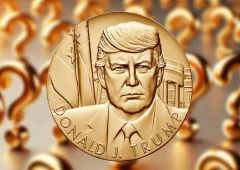Spot Bitcoin ETFs See Best Week Since 2024 Amid Market Recovery
27.04.2025 12:00 2 min. read Alexander Stefanov
Bitcoin investment products just recorded one of their strongest weeks in recent memory, as spot BTC ETFs based in the U.S. attracted over $3 billion in new inflows.
This marks their best performance since November 2024, according to data from SoSoValue.
Leading the charge were BlackRock’s IBIT and Fidelity’s FBTC, which together captured the vast majority of Friday’s inflows — $240 million and $108 million respectively, accounting for 92% of that day’s total activity. The strong inflow streak helped lift total assets in spot Bitcoin ETFs close to $110 billion, with IBIT now controlling nearly 3% of Bitcoin’s circulating supply.
BlackRock’s Jay Jacobs commented that growing global uncertainty is pushing investors toward alternatives like gold and Bitcoin, assets perceived to behave differently from traditional markets.
This surge in ETF activity comes alongside Bitcoin’s price recovery, which saw the asset rebound from April lows near $75,000 to around $95,000 — although BTC has cooled slightly in the past 24 hours, down about 1.2%.
Ethereum ETFs also showed signs of life. After enduring eight consecutive weeks of net outflows, U.S.-listed spot ETH funds finally posted a positive week with $157 million in inflows. However, because of Ethereum’s broader price decline this year, these ETFs now hold less than half the value they managed at the beginning of 2024.
ETH is currently trading near $1,800, slightly down on the day. BlackRock’s ETHA remains the largest U.S. spot Ethereum ETF but still only controls about 1% of ETH’s total supply.
-
1
Bitcoin: Is the Cycle Top In and How to Spot It?
09.07.2025 16:00 2 min. read -
2
Crypto Inflows hit $1B Last Week as Ethereum Outshines Bitcoin in Investor Sentiment
07.07.2025 20:30 2 min. read -
3
Public Companies Outpace ETFs in Bitcoin Buying: Here is What You Need to Know
02.07.2025 12:30 2 min. read -
4
Robert Kiyosaki Buys More Bitcoin, Says He’d Rather Be a ‘Sucker Than a Loser’
02.07.2025 22:00 1 min. read -
5
This Week in Crypto: Whale Accumulation, Ethereum Signals, and a Sentiment Shake-Up
05.07.2025 21:00 3 min. read
Over $5.8 Billion in Ethereum and Bitcoin Options Expired Today: What to Expect?
According to data shared by Wu Blockchain, over $5.8 billion in crypto options expired today, with Ethereum leading the action.
IMF Disputes El Salvador’s Bitcoin Purchases, Cites Asset Consolidation
A new report from the International Monetary Fund (IMF) suggests that El Salvador’s recent Bitcoin accumulation may not stem from ongoing purchases, but rather from a reshuffling of assets across government-controlled wallets.
Ethereum Sparks Altcoin Season as FOMO Shifts Away From Bitcoin
Traders are rapidly shifting their focus to Ethereum and altcoins after Bitcoin’s recent all-time high triggered widespread retail FOMO.
BSTR to Launch With 30,021 BTC, Becomes 4th Largest Public Bitcoin Holder
BSTR Holdings Inc. is set to become the fourth-largest public holder of Bitcoin, announcing it will launch with 30,021 BTC on its balance sheet as part of its public debut.
-
1
Bitcoin: Is the Cycle Top In and How to Spot It?
09.07.2025 16:00 2 min. read -
2
Crypto Inflows hit $1B Last Week as Ethereum Outshines Bitcoin in Investor Sentiment
07.07.2025 20:30 2 min. read -
3
Public Companies Outpace ETFs in Bitcoin Buying: Here is What You Need to Know
02.07.2025 12:30 2 min. read -
4
Robert Kiyosaki Buys More Bitcoin, Says He’d Rather Be a ‘Sucker Than a Loser’
02.07.2025 22:00 1 min. read -
5
This Week in Crypto: Whale Accumulation, Ethereum Signals, and a Sentiment Shake-Up
05.07.2025 21:00 3 min. read


